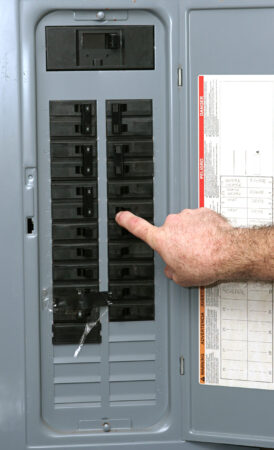A home electrical inspection comprehensively evaluates all electrical components within your household. Your home’s electrical system is an intricate network of wires and circuits concealed within walls, ceilings, and floors. This interconnected system provides power to light switches, outlets, receptacles, and appliances. However, because the system is so widespread and extensive, it also carries an increased risk of defects or performance malfunction.
According to the National Fire Prevention Association (NFPA), problems with electrical distribution or lighting equipment represent the fourth-leading cause of house fires. Fortunately, a professional inspection can promote safety by identifying electrical problems in advance and ensuring that your home complies with legal standards and codes. But what are some of the factors you can expect on inspection day? A look at the fundamentals of residential electrical inspection can ensure you get the most out of this thorough home examination.
What Do Home Electrical Inspections Typically Include?
During an inspection, a licensed electrician takes an in-depth look at your home. The National Electrical Code has established the minimum legal requirements and guidelines for electrical standards in the United States. Trained inspectors use the code as a checklist to ensure your house adheres to these regulations.
Circuits
All circuits must possess the current gauge wire to withstand any heavy load. Circuits must also have proper grounding so that electricity flows safely to the earth, minimizing the risk of electric shock. Appliances like dishwashers and garbage disposals may have dedicated circuits to protect them from potential exposure to water.
GFCI Outlets and AFCI Breakers
During an inspection, the electrician will also evaluate your ground-fault circuit interrupter (GFCI) outlets. Regulations require that homeowners have these for all outlets within 6 feet of water to divert electrical current and reduce the risk of electrocution or injury. If you have a newer home or a remodel, the inspector can also ensure you have the required number of arc-fault circuit interrupter breakers (AFCIs). These breakers de-energize the current and help reduce the risk of electrical fires.
Electrical Panels
An inspection thoroughly reviews the home’s electrical panel, which is also called a breaker box. This object is the central point through which electricity in your home flows into various circuits. All breaker boxes and corresponding outlets or switches need to be at a safe height. For example, outlets should sit 15 inches above the floor or carpet, and switches should be approximately 48 inches higher than the floor. The electrical panel also contains circuit breakers that halt power overloads and may help prevent blown fuses or electrical fires. Inspecting the panel is vital since any sign of rust, corrosion, or damage can impact the performance of your entire system.
Cables and Wires
An electrician can confirm that your cables are anchored correctly to ensure proper configuration. Inspectors can also ensure that the wire gauges match the amperage of the circuit. Wires serve as flexible conductors that transport power and electricity to various sections of your home. Copper and aluminum are the most common types of conductors for residential use. Unfortunately, problems like frayed wires or loose connections can cause electrical faults, breaker trips, sparks, or disruptions. An inspection can provide a game plan for restoring the intricate wiring connections of your household.
Surge Protection
Surge protectors are isolated ground receptacles that help prevent power fluctuations from harming large appliances or electronics. For extra protection, you may wish to invest in a whole-home surge protector to shield every room and appliance in your home.
Wattage
Wattage is a calculation of electrical power. It measures electrical current called ampere (amp) multiplied by electrical drive known as voltage (V). Circuit breakers rate your system in amps and will always indicate the maximum amperage allowed for that circuit. Most homes in the U.S. operate in a range of 120-240V. All lights and appliances have maximum wattage. Exceeding this number can result in overheating and safety hazards. Your electrician will check to ensure the wattage, amps, and voltage comply with recommended standards.
Electrocution Hazards
Common electrocution hazards range from exposed wiring to outdated electrical parts. A professional inspector can ensure your building is up to code so that the wrong surge or equipment does not accidentally harm your family. The inspector can also check for poor practices, such as inadequate installation or overuse of extension cords in one location.
Outdoor Electrical Systems
A trained electrician can check elements of your outdoor electrical systems, like fixtures or connected power equipment, for problems. Common outdoor issues include corrosion from weather exposure or wiring that needs proper insulation. Correcting these problems can also help you comply with neighborhood codes for responsible home ownership.
Following the inspection, an electrician may provide a detailed report of findings. This report can include calculations and data, suggestions for immediate repairs and upgrades, and final certifications from the inspecting authority that your home now complies with the National Electric Code and rules in your municipality or jurisdiction.
When Do You Need a Home Electrical Inspection?
Many homeowners obtain routine electrical inspections each year. At the very least, experts recommend scheduling the inspection at least once every two to three years. Other important times to get an inspection include buying or selling a home, remodeling, or caring for an older home.
Buying or Selling
Depending on your location, local laws may mandate that you receive a documented electrical inspection before purchasing or selling a home. In this case, scheduling an inspection is imperative for avoiding legal troubles or unexpected fines and penalties. A professional appointment allows you to identify and correct problems before the house goes on the market or before you seal the deal. An inspection certificate can increase perceived market value and ensure one less thing you need to worry about when completing a real estate transaction.
Remodels and Additions
It’s important to schedule an inspection whenever you wish to remodel your home, build an addition, or conduct a renovation. In fact, many areas require proof of an inspection to obtain the proper building permits. Even if you want to add a new major appliance to the home’s power grid, an electrical inspection is the best way to ensure seamless integration within the household.
Older Homes
Houses over 25 years old are prone to wear and tear within their electrical systems. The older the home, the less likely its parts are compatible with modern appliances or wiring. In fact, very old homes may have outdated knob-and-tube wiring that requires prompt replacement. An inspector can pinpoint which section of the system needs immediate attention.
Safety Concerns
Home electrical inspections offer peace of mind whenever you have safety concerns. For example, these inspections help stop problems like damaged breakers or crowded circuits that could otherwise trigger electrical fires. Instead of waiting for a fire to break loose, stop the risk factors in their tracks with the help of professional intervention. The inspector can also check to make sure all smoke detectors are functional and that carbon monoxide detectors work equally well to protect your household.
What Are Signs That You Need an Immediate Electrical Inspection?
Although it’s important to schedule an inspection every few years, there are other instances in which you may need to contact an electrician sooner. These include flickering lights and burning odors.
Flickering Lights
Flickering lights can indicate circuit overload or problems with wiring. It can also signify an outdated panel that you should upgrade to match the demands of your home. Call us if you experience flickering lights and popping or cracking sounds when you use a switch.
Burning Smells
Burning is a clear indication of the kind of overheating that can cause house fires. Whether from a melting wire, blown fuse box, or scorched breaker panel, this burning smell indicates that malfunction has already caused damage and defects.
Contact Us Today
Electrical inspections help keep your home functional and ensure your system remains in excellent condition. Thermo Direct provides home electrical services for residences in Raleigh, NC and surrounding areas. We inspect circuit breakers, electrical panels, and all wiring. Our electricians can also install lighting and surge protectors. If you have specific questions during your inspection, we can provide troubleshooting, electrical repairs, or unit upgrades. We also offer full HVAC and plumbing services, so no matter the issue, we can help. Contact Thermo Direct today.









